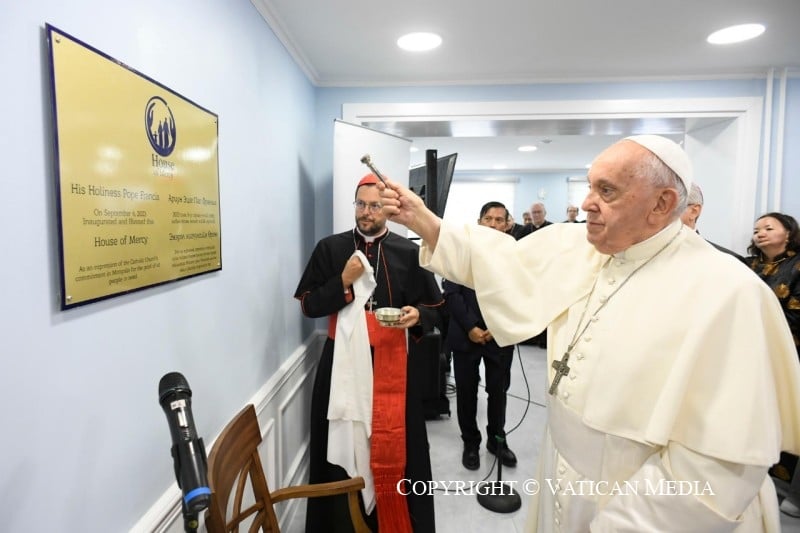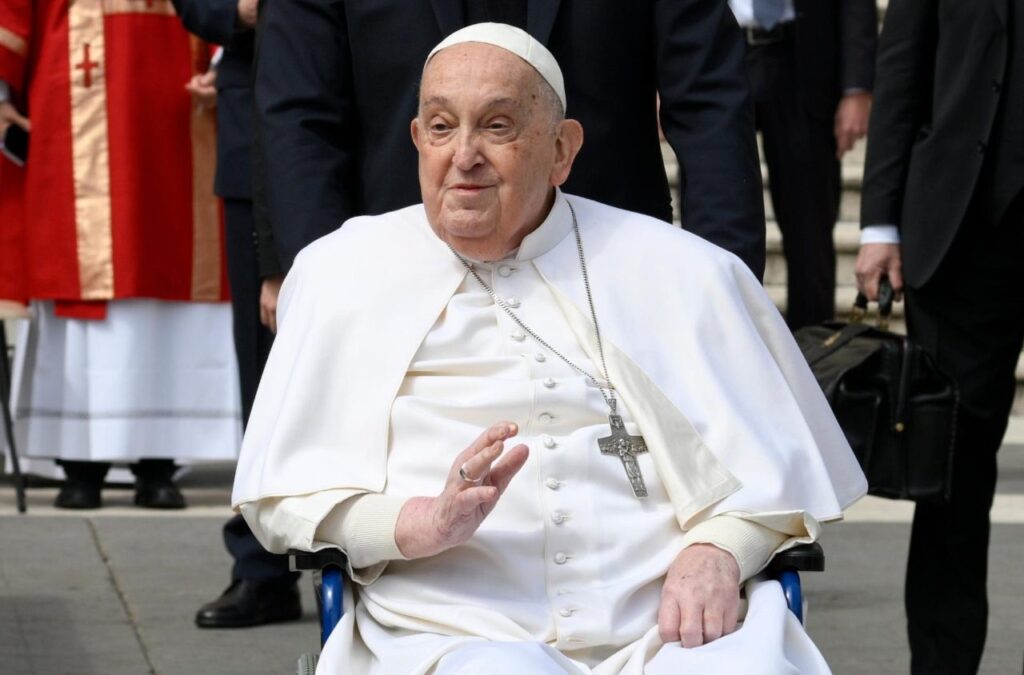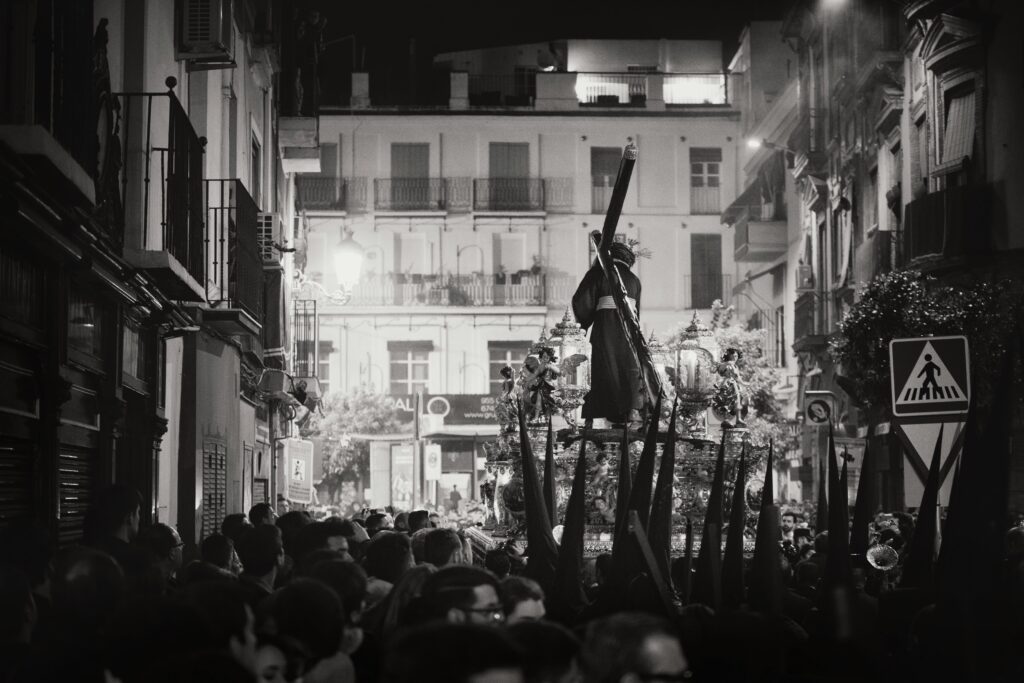“The House of Mercy in Mongolia: a symbol of love and solidarity”
The Pope's Discourse to the Workers of Charity

This morning, before leaving the Apostolic Prefecture of Ulaanbaatar, Pope Francis met the former President of Mongolia, Mr Nambar Enkhbayar, with whom he had a cordial conversation.
Then, after taking leave of the staff and benefactors of the Apostolic Prefecture, the Holy Father moved by car to the House of Mercy where – at 9.30 a.m. (3.30 p.m. Rome’s time) – he met the Charity Workers and inaugurated the facility.
Upon his arrival at the entrance of the House of Mercy, Pope Francis was welcomed by the Director of the facility, Father Andrew Tran Le Phuong, S.D.B..
After the opening song and the welcome greeting from the Director of the House of Mercy, the testimony of the representative of the Health Group took place, followed by the dance of the young people of the Catholic educational facilities. Then, after the testimony of a worker, the Pope delivered his speech.
At the end of the meeting, after the recitation of the Hail Mary, the blessing and the final song, the Holy Father blessed the plaque that will name the charitable facility. He then drove to the Chinggis Khaan International Airport in Ulaanbaatar for the farewell ceremony from Mongolia.
We publish below the speech that the Pope gave during the meeting with the Workers of Charity:
Speech of the Holy Father
Dear brothers and sisters, good morning!
Thank you very much for the warm welcome you have given me and for your song and dance, your words of greeting and your testimonies! I think that it can all be summed up in those words of Jesus: “I was hungry and you gave me food, I was thirsty and you gave me drink” (Mt 25:35). In those words, the Lord gives us the criterion for recognizing him present in our world and the condition for entering into the supreme joy of his kingdom at the Last Judgement,
From the very beginning, the Church took those words seriously, demonstrating in action that charity is a fundamental element of her identity. Charity is a fundamental element of the Church’s identity. I think of the accounts in the Acts of the Apostles and the various ways in which the first Christian community put Jesus’ words into practice, in order to build up a Church firmly established on four pillars: communion, liturgy, service and witness. It is wonderful to see how, after so many centuries, that same spirit pervades the Church in Mongolia: though small in size, its life is marked by fraternal communion, prayer, selfless service to those in need, and witness to its faith. Like the four columns of a great “ger” that support the central upper ring, they allow the whole structure to stand upright and provide a welcoming space within.
So here we are, together, in this house that you have built and that today I have the joy of blessing and inaugurating. It stands as a concrete expression of that care for others that is the hallmark of the Christian community; for where we find welcome, hospitality and openness to others, we breathe in “the fragrance of Christ” (cf. 2 Cor. 2:15). Generous service to our neighbours – concern for their good health, basic needs, education and culture – has distinguished this vibrant portion of the People of God from its inception. From the time of their arrival in Ulaanbaatar in the 1990s, the first missionaries immediately sensed a summons to works of charity, which led them to care for abandoned children, our homeless brothers and sisters, the sick, the disabled, prisoners and all those who, amid suffering, sought their care.
Today we see that, from those roots, a tree has grown, branches have spread out and much fruit has appeared in the form of a variety of praiseworthy charitable initiatives. These in turn have developed into long-term projects, carried out mostly by the various missionary Institutes present here and much appreciated by the population and civil authorities. Indeed, the Mongolian government itself had sought help from Catholic missionaries in confronting the numerous social emergencies of a country that, at the time, was in a delicate phase of political transition and marked by widespread poverty. Those projects continue to draw upon the dedication of missionaries from many countries who put their knowledge, experience, resources and especially their love, at the service of Mongolian society. To them, and to all those who support these many good works, I express my appreciation and offer my heartfelt thanks.
This House of Mercy is meant to be the point of reference for a variety of charitable works: hands outstretched toward our brothers and sisters struggling to navigate life’s problems. A safe haven, in other words, where people can find a listening ear and an understanding heart. While not unlike many other initiatives supported by various Catholic institutions, this new undertaking is also special, since here it is the particular Church that carries out the work, coordinating the efforts of all the missionary groups, while preserving a clearly local identity, as an authentic expression of the Apostolic Prefecture as a whole. I very much like the name you chose to give it: the House of Mercy. Those two words contain a definition of the Church, which is called to be a home where all are welcome and can experience a higher love that stirs and moves the heart: the tender and provident love of the Father, who wants us to be brothers and sisters in his house. It is my hope, then, that all of you can contribute to this project and that the various missionary communities will take active part in it through the commitment of personnel and resources.
For this to happen, the contribution of volunteers is indispensable. A purely generous and selfless service that people freely choose to offer to those in need, not out of concern for financial remuneration or personal benefit, but out of pure love of their neighbour. This is the “style” of service that Jesus taught us when he told his disciples: “Freely you have received, freely give” (Mt 10:8). Serving others in this way may seem like a lost cause, but once they put themselves on the line, those who sacrifice their time and effort discover that whatever they give without expecting anything in return is never lost, but becomes instead a great treasure. Indeed, generosity unburdens the soul, heals the wounds of the heart, brings us closer to God, becomes a source of joy, and keeps us young inside. In this country so full of young people, volunteer work can be a decisive path towards personal and societal growth.
Then too, even in technologically advanced societies with high standards of living, social welfare systems alone are insufficient to provide all the services that are needed. To do so demands legions of volunteers who are willing to commit their time, skills and resources out of love for others. The true progress of a nation is not gauged by economic wealth, much less by investment in the illusory power of armaments, but by its ability to provide for the health, education and integral development of its people. For this reason, I would like to encourage all the citizens of Mongolia, who are well known for their generosity and capacity for self-sacrifice, to engage in volunteer work, placing themselves at the service of others. Here, at the House of Mercy, you have a “training ground” that is always open, where you can exercise your desires for good and train your hearts.
Finally, I would like to reject certain “myths.” First, the myth that only the wealthy can engage in volunteer work. That is indeed a “fantasy”, whereas reality tells us the opposite. It is not necessary to be wealthy to do good; rather, almost always it is people of modest means who choose to devote their time, skills and generosity to caring for others. Another myth needing to be dispelled is that the Catholic Church, distinguished throughout the world for its great commitment to works of social promotion, does all this to proselytize, as if caring for others were a way of enticing people to “join up.” No! The Church does not go forward by proselytism, it goes forward by attraction. Christians do whatever they can to alleviate the suffering of the needy, because in the person of the poor they acknowledge Jesus, the Son of God, and, in him, the dignity of each person, called to be a son or daughter of God. I would like to envision this House of Mercy as a place where people of different creeds, and non-believers as well, can join efforts with local Catholics in order to offer compassionate assistance to our many brothers and sisters in the one human family. Indeed. the word “compassion” means the ability to suffer with others, and the State will rightly seek to protect and promote it. For this dream to come true, it is essential, here and elsewhere, that those in public office support such humanitarian initiatives, encouraging a virtuous synergy for the sake of the common good. Finally, a third myth needs to be discredited: the notion that only money counts, as if the only way to care for others is to employ a salaried staff and invest in large facilities. Certainly, charity demands professionalism, but charitable works should not turn into businesses. Rather, they should retain their freshness as works of charity where those in need can find people ready to listen to them with compassion, regardless of whatever pay they may receive.
In a word, to truly do good, goodness of heart is essential: a commitment to seeking what is best for others. Commitment for the sake of remuneration is not true love; only love can overcome selfishness and keep this world going. In this regard, I would like to conclude with an anecdote from the life of Saint Teresa of Calcutta. A journalist, seeing her bent over the foul-smelling sores of a sick person, once told her, “What you do is beautiful, but, personally, I wouldn’t do it even for a million dollars”. Mother Teresa replied, “I wouldn’t do it for a million dollars either. I do it for the love of God!” I pray that this kind of gratuitous love will be the “value added” of the House of Mercy. For all the good you have done and continue to do, I offer my heartfelt thanks – many, many thanks – and I give you my blessing. And I ask you, please, in your charity, to pray for me. Thank you.
Related

Pope Francis in active recovery: preparing the meditations for the Stations of the Cross while delegating the liturgies of the Triduum
Exaudi Staff
16 April, 2025
2 min

Francis Promotes Spiritual and Pastoral Renewal in Vatican Diplomacy
Exaudi Staff
16 April, 2025
8 min

The Importance of Accepting Your Partner as They Are
José María Contreras
15 April, 2025
2 min

Suffering and Resurrection in Latin America
Rodrigo Guerra
15 April, 2025
3 min
 (EN)
(EN)
 (ES)
(ES)
 (IT)
(IT)

